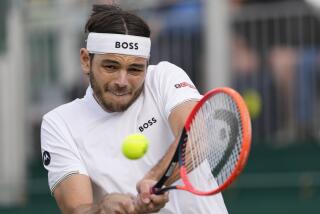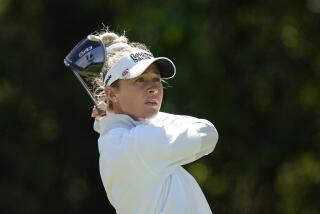U.S. Gets Only a Split in Singles : Davis Cup: Czech substitute sweeps Gilbert after Krickstein takes nearly four hours to win.
- Share via
PRAGUE, Czechoslovakia — It was a historic day for Czechoslovakia, which was blessed with two new names and one new tennis star all within about 12 hours.
The name came first, announced Friday morning as a compromise between the Czechs and the Slovaks. In the Czech region of the country, the name will be the Czechoslovak Federative Republic. The Slovaks will call it the Czecho-slovak Federative Republic. It might have been the first time that a civil war was averted by a hyphen.
But there was only one name that meant anything to the 14,000 fans at the second-round Davis Cup match between Czechoslovakia, or Czecho-slovakia, and the United States Friday night at the Prague Sports Hall.
“Korda, Korda, Korda,” they chanted.
After a 3-hour 57-minute first match, in which the United States’ Aaron Krickstein beat Milan Srejber, 4-6, 7-6 (7-5), 7-6 (7-5), 6-7 (7-4), 6-3, the Czechs were concerned that they would have no reason to cheer.
The second match pitted the world’s fifth-ranked player, Brad Gilbert of the United States, against 22-year-old Petr Korda, who is No. 26.
U.S. Tennis Assn. officials were not so confident that they had already made plane reservations for Vienna, where the winner of this match is likely to play in the semifinals next September--Austria leads Italy, 2-0, in another quarterfinal match this weekend--but they were practicing their waltz steps.
One-two-three is how quickly Korda disposed of Gilbert, 6-2, 6-3, 6-3, in a match that lasted 1 hour 44 minutes.
Gilbert had no reason to be embarrassed, because it is not likely that any other player in the world would have looked much better than he did against Korda, a 6-foot-3 left-hander who plays a little like another Czech native, Ivan Lendl, only more smoothly.
Except for an intimidating first serve, Korda appears to have all the shots. The one that did the most damage Friday night on the fast Supreme Court surface was a top-spin backhand down the line that Gilbert, like everyone else, could only watch, before gasping.
After falling behind, 1-3, in the third set, Gilbert called on his moonball, a lazy lob that, if nothing else, can change the tempo. In this case, it only delayed the inevitable.
Korda appeared bothered, allowing Gilbert a break point. But then the young Czech regained his composure, won the game and performed one of those bent-knee, clenched-fist, Boris Becker-style celebrations. That was the closest Gilbert came to breaking Korda’s serve.
“Brad did everything but come onto the court in a parachute,” U.S. Captain Tom Gorman said.
Gilbert, who had a 2-0 record against Korda before this match, said he had never seen him play that well. Neither had anyone else, at least not through three sets.
“I’ve seen him play that well many times, but never until the end of the match,” Czech Captain Frantisek Pala said.
Shucks, Korda said, it was nothing.
“I used tactics my father taught me,” he said. “You hit the ball over the net and into the other court.”
If only the game was that simple all the time. Korda was an outstanding junior player, but fans here in Prague, his hometown, were wondering if he would develop.
He was ranked 59th last year, which he said was because of a mysterious back injury. The cure was even more mysterious. He said it was prescribed by “a medicine man.”
What was the cure?
“Top secret,” he said.
It must have worked because he has leaped in the rankings, after advancing to the semifinals of the pro indoor championships two weeks ago in Philadelphia.
Until then, Czech fans were beginning to think his future might be as a doubles player. That indeed could be his immediate future. Pala had announced Thursday that Tomas Smid and Karel Novacek would play doubles today against heavily favored Rick Leach and Jim Pugh. But after Korda’s inspired performance Friday night, Pala probably will pair him with Smid.
On Sunday, it will be Krickstein’s turn to face Korda in the first match, followed by a potentially decisive match between Gilbert and Srejber. Gilbert is 4-0 against Srejber; Krickstein and Korda have never met.
Krickstein, ranked seventh, will have to play better to beat Korda than he did against the 59th-ranked Srejber. But then Krickstein, a steady baseliner, has the type of game that never seems to impress anyone, even his opponents.
All Krickstein does is win, particularly when pushed to a fifth set. Since he was a 16-year-old U.S. Open quarterfinalist in 1983, he has lost only five matches when they have gone five sets.
So even though he lost a tiebreaker in the fourth set Friday night, he said he was confident he would win the match.
“When I go five sets, I think it’s going to take a great effort by the other guy to beat me,” Krickstein said.
Srejber, a 6-foot-8 power player, left his great effort behind in the first set, when his serve was overpowering. Krickstein won only three points on Srejber’s serve in the first set.
But Krickstein is like one of those children’s punching bags that keep bouncing back. He won second- and third-set tiebreakers, both at 7-5, lost the fourth-set tiebreaker, 7-4, and then played his best set of the match.
“I don’t know if they have this word in Czech, but that match was awesome ,” Gorman said.
Srejber blamed a leg injury, a neck injury, poor conditioning and the umpire. It seemed as if he would have said anything to keep from giving Krickstein credit.
But then Korda saved the day for the Czechs and the Slovaks, which was ironic because he might not have played singles if the country’s No. 1 player, Miloslav Mecir, had not withdrawn because of a back injury.
Asked if he would have used Korda even if Mecir had been available, Pala would not answer. Smart captain.
More to Read
Go beyond the scoreboard
Get the latest on L.A.'s teams in the daily Sports Report newsletter.
You may occasionally receive promotional content from the Los Angeles Times.










